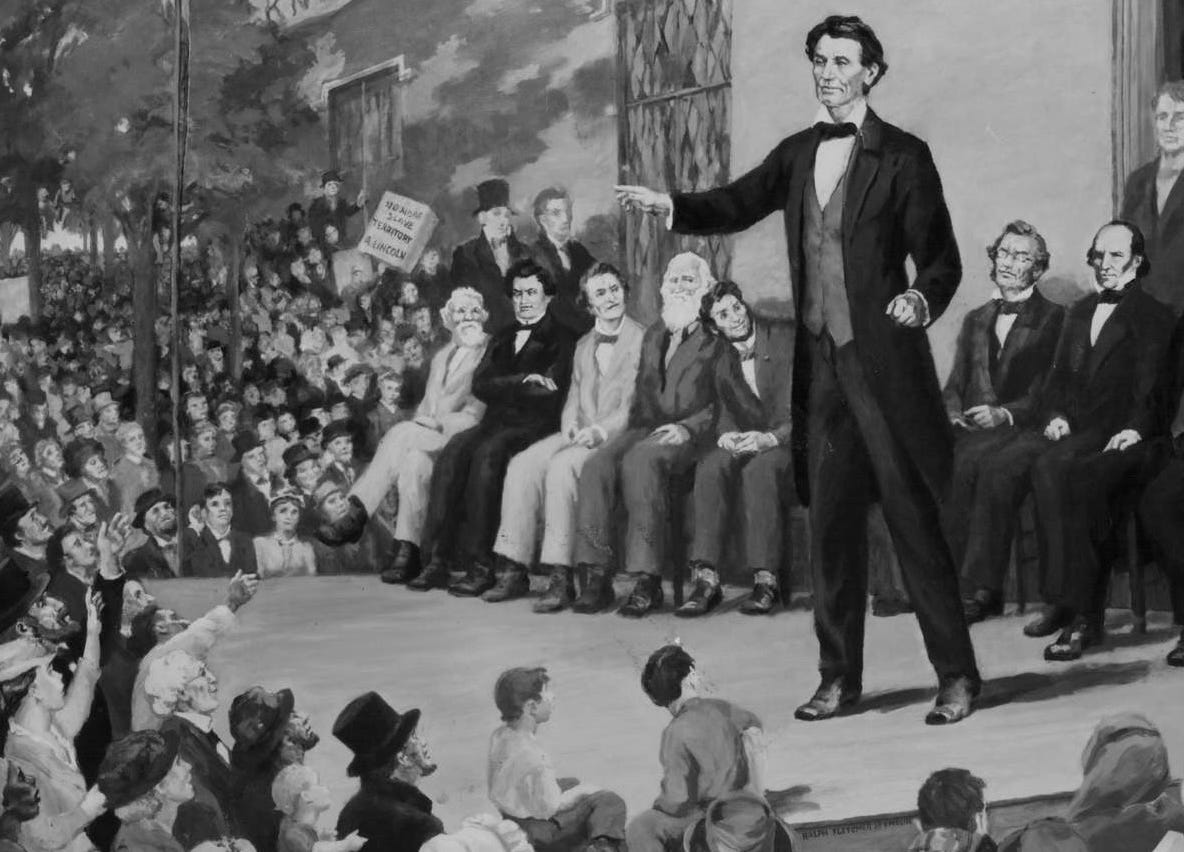Unpacking This Curious Title
I chose these terms because they are unusual words that might inspire some to pause and think. That's what this Substack is all about.
As I launch this new Substack, I thought I’d use a little space to explain the peculiar title I’ve chosen—Liberty Lyceum—and the stranger subtitle—Zetetic Questions for the Zeitgeist.
Maybe we shouldn’t judge a book by a cover, but sometimes there’s meaning packed into a title. Let’s unpack this one.
LYCEUM: Second only to Plato’s Academy, the Lyceum—founded by Plato’s student, Aristotle—is, arguably, the most famous school in all of human history. The Lyceum was located just outside the city walls of Athens, in a grove named after Apollo Lyceus.
Participants in the Lyceum adopted a peripatetic method, so named from the Greek word “peripatētikós” meaning “to walk about.” Aristotle and his students would discuss and debate the nature of the whole—of which human beings are part—and the beautiful orders and hierarchies found within nature—while walking around the Lyceum's covered walkways, or “peripatoi.”
There’s also an American connection.
Originating in the early 19th century, Americans voluntarily organized community lyceums, which were part of a broader movement aiming at self-improvement and community education. Lyceums featured philosophical, political, and historical lectures and debates for the general public, which provided excellent platforms for young people to practice their public speaking skills.
Abraham Lincoln gave one of his most important early speeches—“The Perpetuation of Our Political Institutions”— to the Young Men's Lyceum of Springfield, Illinois, on January 27, 1838.
Lincoln speaking at a forum named after Aristotle’s classical Athenian school! As a Lincoln man and an Aristotelian, that’s some history I love.
LIBERTY: The lyceum I am creating is focused on liberty. I make no bones about that.
I care about human liberty because I care about human beings. Liberty—meaning real individual choice and laws that protect the natural freedom and private property of each citizen—has done more to alleviate poverty and human suffering than anything else in history, hands down. Nothing comes close.
When individuals exercise the virtues necessary to maintain a free society and free markets—when they are self-governing, self-assertive, productive, self-reliant, wise, courageous, and just—they enjoy the beauty of a life well-lived.
Those who say they care about people and then restrain liberty by promoting more regulations, more control, more command, more subsidies, more redistribution of what belongs to others, are either lying or confused.
The results of THEIR efforts are idleness, dependency, irresponsibility, and loss of meaning or purpose, which then cause and correlate with all kinds of social pathologies, not least of which are increasing rates of addiction, depression, suicide, and nihilistic mass murders of random strangers. They hurt people as they stammer insistently that they care.
ZETETIC: This is a wonderful word. Used as either an adjective or noun, zetetic points to the process of learning by inquiry or investigation. Zeteticism emphasizes open, rigorous questioning and investigation to arrive at knowledge or understanding.
Zetetic traces back to the Greek word “zēteō,” meaning “to seek” or “inquire.” In more modern contexts, zetetic is often synonymous with skeptical inquiry and the questioning of established, culturally dominant beliefs and opinions.
A zetetic, in other words, isn’t merely a skeptic; a zetetic doesn’t merely ask random questions about random subjects. A zetetic directs questions to those who shape popular, public opinion, or what some might call “political correctness.”
A zetetic doesn’t simply swallow hook, line, and sinker whatever today’s priests of political correctness preach. A zetetic listens to those priests and then presses them with questions with the aim of understanding, clarifying, and exposing contradictions and otherwise weak arguments.
A zetetic person values truth more than cheering for whatever is popular in the moment. Zeteticism is not for the shallow-minded or weak-willed. It requires intellectual horsepower and courage, to boot.
ZEITGEIST: Here I’ve borrowed a German word derived from modern German philosophy. “Zeit” means time and “geist” means spirit or ghost. Zeitgeist is literally “spirit of the time” or “time spirit.” Zeitgeist refers to the dominant ideas and beliefs that define a way of life for a particular people at a particular moment in time.
When a zetetic philosopher asks questions, he is most concerned with the teachings and doctrines that are most popular, that have become morally, culturally, and perhaps even legally authoritative. A zetetic philosopher, in other words, asks questions of those who shape the zeitgeist.
Combine these terms and ideas and you get Liberty Lyceum: Zetetic Questions for the Zeitgeist. The digital content you’ll find here focuses—not entirely, but mostly—on fortifying the cause of human liberty through Lyceum-style learning and public writing and speaking, all of which stems from addressing zetetic questions about our zeitgeist, today.
Our zeitgeist, today, in the modern United States, is the spirit of progress, or progressivism.





